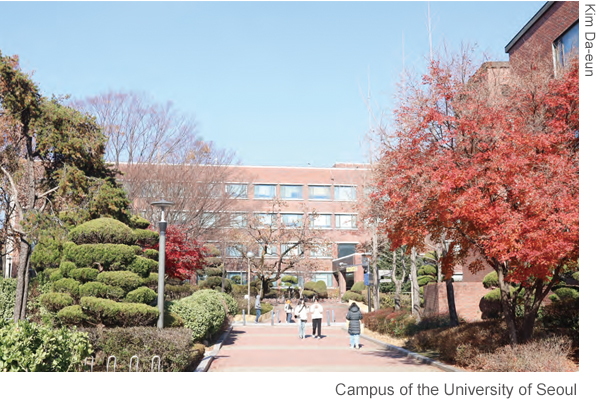One of the most distinctive characteristics of the University of Seoul (UOS) is its relatively cheap tuition fee. According to the Ministry of Education, the average tuition fee in South Korea is 6,795,000 won per year, which is about 3,400,000 won per semester.
However, UOS students do not have to pay that much. Humanities students’ tuition fee per semester is about 1,022,000 won, Engineering students’ is 1,350,500 won, and Arts students’ is 1,610,500 won.
This so-called “half-price tuition fee” has been maintained for 11 years until 2023. The half-price tuition fee policy was started by the former Mayor of Seoul City, Park Won-soon from the Democratic Party of Korea because it was one of his campaign pledges. This policy was made to alleviate students’ monetary burden on tuition fees and to make them more focused on their academic activities.

However, the policy on tuition fees is about to change. On December 18, 2022, Seoul Metropolitan Council confirmed that the budget for UOS which was submitted by Seoul Metropolitan Government for the 2023 fiscal year was reduced by 10 billion won (17.3 percent) to 47.7 billion won.
This was a huge reduction in the city support fund. As of 2022, the city support fund accounted for 87.5 billion won (62 percent) of UOS’s total budget of 140.3 billion won. In response to this decision, former UOS President Suh Soon-tak expressed concern about this matter, saying “This is the very first time we have seen such a drastic cut in city support,” and “It is truly difficult to handle.”
This unprecedented budget reduction could be interpreted as pressure from the Seoul Metropolitan Council, where the initiative transferred to the People Power Party for the first time in 12 years, to eliminate the policy under former Mayor Park. Moreover, Kim Hyeon-ki, the chair of the Seoul Metropolitan Council, has called for an end to the half-price tuition fee policy, officially defining it as a “populist policy.”
Public Deliberation for Tuition Normalization Committee
To discuss this serious matter, the Public Deliberation for Tuition Normalization Committee was formed, which includes representatives from both Seoul Metropolitan Council and UOS.
The word “normalization” can be controversial because it connotes that the policy which has been continued for 11 years is abnormal. The committee consists of 18 individuals including five internal members, five external members, and eight concerned individuals. The committee holds a meeting once a month until November 2023, which is the time the 2024 tuition fee is determined.
Since May 8, 2023, the committee has held its five meetings so far, and two of them were public debates. At the first public debate held on September 8, 2023, opinions of proponents and opponents were intensely conflicted. For the opponents’ opinion, the committee is not in a neutral position because of the term “normalization.”
Moreover, the half-price tuition policy should be continued because changing tuition fees depending on the political situation is unreasonable for students. However, more than half of the presented opinion was for proponents’ ones. Based on this, the second public debate was held on October 12, 2023. In the second debate, positive opinions dominated on tuition increase.
One of the committee members said, “The increase in dependence on city subsidies seriously reduces the financial autonomy of UOS.” Some pointed out that it is necessary to go beyond raising tuition and restore it to its original state of 4.86 million won, a one-year tuition fee as of 2010. To gain further insight into this case, The UOS Times interviewed two international students (A and B) and two domestic students (C and D) from UOS.

Graduate Student A from the Department of Social Welfare
“As an international student, I already pay twice as much tuition as domestic students do. Still, tuition increases do not seem reasonable for any reason. Considering the concerns about the deterioration of the quality of the school curriculum, students need to put more effort into studying independently rather than worrying about class quality. This is because the knowledge given by the professor is what students themselves have to absorb by their capabilities.”

Student B from the School of Business Administration
“It just does not add up to suddenly raise tuition while it has been maintained with government support until now. The increased financial burden will only make it difficult to concentrate on our studies due to part-time work we will be forced to do. I cannot even agree that the quality of classes at school is not good because I am so satisfied with all the qualified professors in my department.”

Student C from the Department of Korean History
“I am positive about half-tuition in that it reduces the financial burden on students. Instead of raising tuition, the decline in student welfare of education quality can be supplemented with government support.”

Student D from the Department of English Language and Literature
“I utterly agree with half-tuition. Rather than paying additional fees, leaving the funds for each student’s spare money would be far more helpful to improve the quality of life because students can spend for their leisure and daily necessities.”

The majority of interviewed students generally agreed in favor of half-tuition through interviews, citing that the reduced tuition burden allows them to gain diverse experiences such as travel or overseas training, and increases their time to study instead of earning for living.
Nevertheless, there are some concerns about its negative effects. The decrease in tuition may negatively affect not only the quality of education or student welfare but also the learning atmosphere.
Due to the low tuition burden, students may not be focused on their studies with other alternatives in mind. In order to enter another university, students try to do Bansoo (a Korean term used to refer to the act of taking K-SAT again while attending a university).
That is why many students planning for Bansoo enter national universities, such as UOS, with relatively low tuition fees, and this may ruin the overall learning atmosphere of the school. Amid disputes between pros and cons over tuition, the concern for both sides is that the school is affected by the political situation.
The start of the half-tuition fee was also a pork-barrel pledge by the political community ahead of the election. Therefore, it is not desirable to decide whether to abolish it by the influence of politicians.
For the impact of tuition changes on both schools and students, there are mixed expectations: some foresee that students will receive improved education while others underlines that students’ financial burden will increase. Currently, with about two meetings of the tuition committee left, many are paying attention to what decision will be made on the amount of tuition for the 2024 school year.
By the way, it is also necessary to assure that the voices of students are sufficiently being reflected. For the resolution, more than half of the votes are required. However, of 11 members of the tuition review committee that practically decides tuition fees, only four are student members. Therefore, there is the possibility that students’ votes will be ignored.
The UOS Times hopes that students’ opinions will make a significant impact on the decision since they are the ones who must bear the consequence.
Kim Da-eun
daeunkim749@uos.ac.kr
Jeong Woo-yeon
wyjung0228@naver.com

